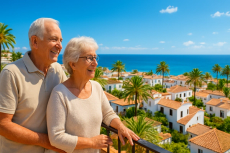Blog • Published on:October 6, 2025 | Updated on:October 6, 2025 • 18 Min
Your Complete Guide to Living in St Lucia in 2025
St. Lucia captures what many dream of when they picture life in the Caribbean, calm blue waters, green hillsides, and a lifestyle that is so laidback, it’s practically horizontal. Yet behind its beauty lies something deeper: a country that offers the good life to those prepared to invest in its charms.
Living here can mean morning hikes with ocean views, neighbors who greet you by your name, and the comfort of an English-speaking community that makes settling in feel effortless. It also means access to attractive tax conditions, real estate opportunities, and a growing expat network that gives the island an international edge.
This guide walks you through what it’s really like to live in St. Lucia in 2025, from residency options and costs to healthcare, property, and local culture, so you can decide if this island is the right place to build your next chapter.
Looking to make your move official? Learn how the St. Lucia Citizenship by Investment Program offers a direct path to Caribbean citizenship and global mobility.
Why Choose Living in St. Lucia
Life in St. Lucia is about balance. The island has found a rare middle ground between tranquility and possibility. Many expats come for the climate but stay for the quality of life that slowly but surely grows on you.
A Caribbean Lifestyle with Substance
Days are shaped by sunlight and sea breeze, yet the lifestyle extends beyond leisure. St. Lucia offers a genuine sense of community, where locals and newcomers mix easily, and social life revolves around beaches, markets, and shared meals rather than constant rush.
Natural Beauty That Defines Daily Life
The island’s 626 square kilometers hold some of the Caribbean’s most dramatic landscapes, from the volcanic peaks of the Pitons to rainforest trails and calm bays ideal for sailing or diving. For those seeking a slower pace that still feels alive, few places offer such contrast.
A Smart Financial Base
St. Lucia stands out for its simple and investor-friendly tax framework. Residents pay no tax on worldwide income, capital gains, inheritance, or wealth, making it appealing for entrepreneurs, retirees, and remote professionals. Residential property tax is minimal, capped at 0.25% of the property’s value per year.
An Active and Welcoming Expat Community
Roughly 7.5% of St. Lucia’s population is foreign-born, with noticeable communities from the US, UK, and Canada. Most settle in areas like Rodney Bay, Castries, and Cap Estate, where modern amenities blend with easy island living. This mix gives newcomers both comfort and connection, two things that make adapting here effortless.
For a closer look at the island’s security and expat experience, explore Is St. Lucia Safe? Travel Guide for 2025.
Requirements for Moving to St. Lucia
Relocating to St. Lucia is a straightforward process compared to many destinations in the Caribbean.
The country maintains clear immigration policies, several residency paths, and an established citizenship program that appeals to both investors and long-term residents.
Visa Requirements and Entry Permits
Nationals from the United States, Canada, the UK, and most EU countries can enter St. Lucia visa-free for up to six weeks.
Longer stays require a Single-Entry Visa or Multiple-Entry Visa, depending on the purpose of visit.
- Single Entry Visa – allows a stay of up to three months and is suitable for short-term relocation or extended visits.
- Multiple Entry Visa – valid for up to one year and ideal for those dividing time between St. Lucia and another country.
Work permits are mandatory for foreign nationals who intend to take employment locally. These are issued through the Ministry of Labour, typically within several weeks once all documents are verified.
Residency Options
Staying beyond a year requires obtaining residency status, which can be achieved through several routes:
- Long-Stay Visa or Work Permit: Initially allows residence for up to one year, renewable annually.
- Permanent Residency: Eligible after two years of continuous legal residence under a valid visa or work permit, subject to Ministry approval.
- Citizenship by Naturalization: Possible after seven years of residence, including time spent under permanent residency.
This pathway is often chosen by retirees and families seeking long-term settlement without investment obligations.
St. Lucia Citizenship by Investment Program
For those who prefer a faster route, St. Lucia’s Citizenship by Investment Program (CIP) offers direct access to citizenship within four to six months.
The program, launched in 2015, allows investors to obtain citizenship by contributing to one of several qualifying options:
- Donation to the National Economic Fund (NEF) – minimum $240,000 for a single applicant or a main applicant with up to three dependents. Additional dependents under 18 require an extra $10,000 each; those over 18, $20,000.
- Real Estate Investment – minimum $300,000 in a government-approved property.
- Enterprise Project (Approved Business Investment) – minimum $250,000 for a main applicant with up to three dependents. Additional dependents can be added for $10,000 each.
- National Action Bonds (NAB) – investment of $300,000 held for five years, plus a $50,000 non-refundable administrative fee.
A St. Lucian passport grants visa-free, visa-on-arrival, and eVisa access to over 150+ destinations, including the UK, Schengen Area, Hong Kong, and Singapore.
You can explore full program details on our St. Lucia Citizenship by Investment page or compare it with other top Caribbean citizenship options.
Cost of Living in St. Lucia
St. Lucia offers a moderate cost of living compared to other Caribbean islands. While imported goods and private healthcare can be pricey, day-to-day life remains affordable for most expats.
Housing and Real Estate Prices
- One-bedroom apartment (city center): around $500 per month
- Three-bedroom apartment (city center): around $875 per month
- Property purchase: prices average $140–160 per sq meter in central areas
Rental costs are lower outside Castries and Rodney Bay, with comfortable suburban homes available for $600–$700 per month.
Daily Expenses Overview
- Meal at a local restaurant: about $8
- Three-course dinner for two: around $75
- Utilities (electricity, water, garbage): around $105 per month for a medium apartment
- Internet (60 Mbps, unlimited): about $45 per month
Healthcare Costs
Public healthcare is available but limited in scope. Most expats use private clinics or hospitals, where a general consultation typically costs $40–$60.
Comprehensive international health insurance is recommended for those relocating long term.
Transportation and Utilities
- Public transport (one-way): around $1
- Taxi (short ride): about $8–$10
- Gasoline: averages $5.50 per gallon
Owning a car is common among expats living outside the main urban areas, as public transport is basic but reliable within towns.
Best Places to Live in St. Lucia
Each part of St. Lucia has its own rhythm. Some neighborhoods are lively and social, others quiet and private.
Here are the most popular areas among expats and what makes each of them stand out.
Rodney Bay
Rodney Bay on the northwest coast is where most newcomers begin their island journey.
It’s lively yet organized, offering everything within reach, supermarkets, restaurants, schools, and one of the best marinas in the Caribbean.
Modern apartments and townhouses line the waterfront, while gated communities cater to long-term expats and retirees.
It’s a safe, walkable area with easy access to beaches like Reduit Bay. Housing costs are higher here than elsewhere, but so is convenience.
Castries
Castries, the island’s capital, is practical and well-connected. It’s home to major offices, local businesses, and the island’s main port.
Living here suits those who want to be close to the action, work, government offices, or transport links.
Rentals and daily costs are slightly lower than in Rodney Bay, and there’s a mix of modern apartments and older colonial homes.
The central areas can be busy and noisy, but suburbs like Vigie and Morne Fortune offer quieter options.
Soufrière
Soufrière is the heart of St. Lucia’s natural charm. The Piton mountains rise behind the town, and the area is surrounded by rainforests, waterfalls, and black-sand beaches.
It attracts nature lovers, digital nomads, and eco-retirees looking for peace and privacy. Many homes here are boutique villas or hillside cottages with open views.
The trade-off is convenience, shops and services are limited, and the drive to the capital takes about an hour and a half.
Cap Estate
Cap Estate, on the island’s northern tip, is the most exclusive address in St. Lucia. Elegant villas, golf-course estates, and ocean-view residences make it ideal for investors and high-net-worth expats.
The area offers privacy, clean infrastructure, and proximity to both Rodney Bay and the island’s best beaches, including Smuggler’s Cove.
Prices are higher than elsewhere, but the quality of life, security, and investment potential justify the premium.
Healthcare System in St. Lucia
St. Lucia’s healthcare network combines public facilities with private hospitals and clinics that cater to both locals and expatriates.
While the public system covers essential care, most expats rely on private providers for faster service and wider treatment options.
Public Healthcare Facilities
Public healthcare is managed by the Ministry of Health, Wellness and Elderly Affairs. The system includes two main public hospitals, Owen King European Union Hospital in Castries and St. Jude Hospital in Vieux Fort, along with several smaller community wellness centres across the island.
Basic consultations, emergency services, and maternity care are accessible and affordable. However, equipment and staffing can be limited, especially in rural areas, and specialist care often involves long waiting times or referrals abroad.
Private Medical Options
Private healthcare standards are generally higher, with shorter waits and more specialized services.
Leading facilities include Tapion Hospital in Castries and Rodney Bay Medical Centre, both known for professional English-speaking staff and modern diagnostic equipment.
Consultations typically range between $40 and $70, while private insurance policies usually cover hospitalization and specialist visits.
Many expats also choose regional coverage that includes nearby islands or Miami for advanced treatment.
Health Insurance Requirements
Health insurance is not legally required for residency, but it is strongly recommended. Policies tailored for Caribbean living, including those from providers like Cigna Global or BUPA, ensure coverage for private clinics and international evacuation if needed.
Applicants for residency or citizenship often include proof of insurance in their documentation as a precaution, even when it’s not mandatory.
Working and Business in St. Lucia
St. Lucia is not just a scenic escape, it’s a small but growing economy with clear legal frameworks, English-speaking talent, and welcoming policies for entrepreneurs and remote professionals.
The country’s stability, tax advantages, and lifestyle quality make it one of the Caribbean’s most balanced places to live and work.
Employment Opportunities
The local job market centers around a few key industries:
- Tourism and hospitality – resorts, marketing, management, and operations roles.
- Financial services and real estate – banking, accounting, and property management.
- Education and healthcare – international schools and private clinics often seek qualified professionals.
- Renewable energy and infrastructure – ongoing government-backed projects attract foreign expertise.
Work permits are issued by the Ministry of Labour and usually valid for one year. The employer must show that no suitable local candidate is available.
Remote workers employed by foreign companies can reside in St. Lucia using multi-entry visas or temporary residency permits.
Business and Investment Options
Entrepreneurs find the process of setting up a business relatively straightforward. St. Lucia’s laws allow full foreign ownership and offer access to international banking and trade.
Advantages include:
- Corporate income tax capped at 30%, with possible incentives and exemptions.
- No capital gains, inheritance, or wealth tax.
- No restrictions on repatriation of profits or dividends.
- Access to double taxation treaties with countries like the UK and Canada.
- Straightforward company registration through the Commercial Registry.
Popular investment sectors:
- Boutique hotels and villa developments
- Sustainable agriculture and agritech
- Renewable energy and eco-tourism
- Real estate and property rentals
Remote Work Possibilities
St. Lucia has become an attractive hub for digital professionals and business owners who work online.
- High-speed internet is available across major towns, especially in Rodney Bay and Castries.
- Coworking lounges and serviced offices cater to remote teams.
- The time zone (GMT-4) aligns well with North America, making business coordination smooth.
- Long-stay permits and multi-entry visas allow legal residence for those earning income abroad.
Practical Aspects of Living in St. Lucia
Daily life in St. Lucia is easy to navigate once you understand how local systems work. Banking, transport, education, and property ownership are all accessible to foreign residents, though processes may take longer than in larger economies.
Banking and Finance
Opening a bank account in St. Lucia is straightforward but requires physical presence and standard documentation.
Main banks:
- 1st National Bank St. Lucia
- Republic Bank
- Bank of Saint Lucia
- CIBC Caribbean
Requirements:
- Valid passport and proof of legal residence or visa
- Proof of address (local lease or utility bill)
- Reference letter from a previous bank
Both local and international accounts are available, and multi-currency banking is common. Online banking is reliable, and credit/debit cards are widely accepted.
Property Purchase Process
Foreign nationals can buy property in St. Lucia, either directly or through the Citizenship by Investment Program.
Key points:
- Non-citizens must obtain an Alien Landholding License (ALHL) before purchasing property.
- The license fee typically amounts to 10% of the property value.
- The process takes around 2–3 months, depending on documentation.
- Buyers who acquire property through the citizenship program are exempt from the ALHL requirement.
Legal fees, government charges, and due diligence costs should be factored into total acquisition expenses.
Transportation Systems
Public transport in St. Lucia is simple and inexpensive.
- Mini-buses are the main mode of public transport, connecting Castries, Gros Islet, Vieux Fort, and Soufrière.
- Fares are typically under $1 per trip.
- Taxis are available island-wide but can be costly for long distances.
- Most expats prefer to own or lease a car, especially when living outside the capital.
Driving is on the left-hand side, and a temporary local driving permit can be obtained with an international license.
Education Options
Education standards in St. Lucia are good, especially at private and international schools.
Options include:
- International School Saint Lucia (Rodney Bay)
- Bonne Terre Preparatory (Gros Islet)
- International School Saint Lucia (Castries)
The public education system is free and English-based, but most expats choose private institutions for smaller class sizes and global curricula.
Higher education options include the Sir Arthur Lewis Community College and offshore medical universities that attract international students.
Legal Requirements for St. Lucia Residents
St. Lucia maintains a transparent and investor-friendly legal system based on English common law.
Foreigners can live, work, and invest in the country under well-defined frameworks, and residency processes are handled efficiently through the relevant ministries.
Immigration Procedures
Residency and immigration matters are managed by the Department of Immigration under the Ministry of Home Affairs.
Key steps for long-term stay:
- Enter the country on a Single-Entry Visa (up to 3 months) or Multiple-Entry Visa (up to 1 year).
- After two years of legal residence, apply for Temporary Residency.
- Once temporary residency has been held continuously, apply for Permanent Residency (after a total of 5 years of living in the country).
- After living full-time on the island for 7 years, apply for citizenship by naturalization if desired.
Applicants for both temporary and permanent residency must show proof of income, clean police records, and valid health insurance coverage.
Tax Considerations
St. Lucia’s tax regime is one of the island’s most attractive features for residents and investors.
Highlights:
- No tax on worldwide income, foreign dividends, or capital gains.
- No inheritance or wealth tax.
- Corporate income tax capped at 30%, with potential reductions through investment incentives.
- Residents are considered tax-liable only on income earned locally.
To qualify as a tax resident, individuals must spend at least 183 days per year in St. Lucia. U.S. citizens living in St. Lucia must still file annual tax returns with the IRS due to citizenship-based taxation.
Property Rights
Foreigners enjoy full legal protection for property ownership in St. Lucia.
Important points:
- Freehold ownership is available, and titles are registered with the Land Registry.
- The Alien Landholding License (ALHL) is required for non-citizens buying property outside approved development zones.
- Residential property tax is modest — 0.25% of the property’s market value per year.
- Foreign investors can purchase property under the Citizenship by Investment Program, bypassing the ALHL requirement.
St. Lucia also has legal firms experienced in handling property transfers, inheritance planning, and cross-border ownership structures for expats.
Lifestyle and Culture in St. Lucia
Living in St. Lucia means adopting a slower, more grounded rhythm. Life here balances modern convenience with a strong sense of community and local identity.
You’ll find neighbors who know your name, street vendors who remember your usual order, and a shared respect for the island’s natural beauty and traditions.
Climate and Weather
St. Lucia enjoys a tropical climate with average temperatures between 77°F and 86°F (25°C–30°C) year-round.
- The dry season runs from December to May, offering clear skies and calm seas.
- The wet season lasts from June to November, bringing occasional tropical showers and lush greenery.
The island’s constant sea breeze keeps even the warmer months comfortable, though air conditioning is common in modern homes.
Local Customs
St. Lucians are warm, polite, and community-minded. A simple “Good morning” or “Good afternoon” goes a long way in daily interactions. The culture blends African, French, and British influences, reflected in both language and lifestyle.
- Language: English is official, but Saint Lucian Creole (Kwéyòl) is widely spoken in informal settings.
- Religion: Around 90% of the population is Christian, with Catholic and Protestant denominations most common.
- Public holidays often celebrate national identity — Independence Day, Creole Heritage Month, and the annual Jazz Festival are deeply rooted in local culture.
Social Life and Activities
Life in St. Lucia is outdoor-oriented. Expats and locals gather around beaches, marinas, and open-air cafes, especially in Rodney Bay and Gros Islet.
Popular activities include:
- Sailing and yachting around Rodney Bay Marina
- Hiking the Piton mountains or rainforest trails
- Visiting hot springs near Soufrière
- Attending cultural events like the St. Lucia Jazz & Arts Festival and Carnival in July
Dining out ranges from family-run Creole eateries to fine dining with ocean views. Nightlife is relaxed; live music, open-air bars, and weekend street festivals replace the fast pace of city life.
Safety and Security
St. Lucia is among the safer Caribbean destinations, with stable governance and a welcoming atmosphere.
- Petty theft can occur, particularly in crowded or tourist-heavy areas, so basic precautions are advised.
- Gated communities and private security are common in expat areas such as Rodney Bay and Cap Estate.
- The police maintain good visibility in key districts, and emergency services are responsive.
Overall, safety concerns are low for residents who exercise common sense, the island remains one of the most secure and livable in the region.
Moving to St. Lucia: Step-by-Step Guide
Relocating to St. Lucia is a manageable process when approached with the right preparation.
The country’s immigration rules are straightforward, and setting up life on the island becomes much easier once you understand the practical steps involved.
Planning Your Move
Before anything else, research where you want to live, coastal hubs like Rodney Bay and Cap Estate are convenient, while Soufrière offers peace and privacy.
- Estimate your living costs based on rent, groceries, utilities, and transport.
- Decide whether you’ll rent or buy property, rentals are ideal for the first six months while you settle.
- If moving for work or business, ensure your employment or company registration documents are ready before arrival.
Engaging a local attorney or relocation advisor can save time during residency, banking, or property procedures.
Documentation Required
To apply for long-term stay or residency, prepare the following:
- Valid passport (minimum 6-month validity)
- Recent passport photos
- Police clearance certificate
- Proof of income or employment
- Health insurance documentation
- Lease agreement or proof of local address
- Completed residency application forms
For property buyers, include your Alien Landholding License or proof of investment approval.
Processing times typically range from 2 to 3 months for visas and up to 6 months for permanent residency applications.
Setting Up Your New Life
Once on the island, you’ll find most essentials easy to organize within a few weeks:
- Open a local bank account — most banks accept foreign clients with proof of residence.
- Register for utilities (electricity, water, internet) under your name.
- Secure health insurance if you plan to rely on private healthcare.
- Enrol children in schools or arrange private tutors if needed.
- Join expat and business groups in Rodney Bay or Castries to build local connections.
Many newcomers also use the first year to explore the island’s investment landscape, from real estate to citizenship opportunities, to decide on a long-term residency or second passport.
How to Start Your New Life in St. Lucia
Relocating to St. Lucia is a strategic move toward freedom, security, and long-term opportunity. With its investor-friendly laws, stable economy, and world-class natural environment, the island offers a rare combination of peace and potential.
If you’re planning to make St. Lucia your home, start by exploring the right residency or citizenship route for your goals.
The St. Lucia Citizenship by Investment Program provides one of the most efficient and transparent pathways to full Caribbean citizenship.
Contact Savory & Partners today to receive personalized guidance on relocation, investment, and citizenship options in St. Lucia.
FAQs on Living in St. Lucia
How can I get permanent residency in St. Lucia?
You can apply for permanent residency after holding temporary residency for five consecutive years. This requires proof of continuous residence, a clean police record, and stable income or investment in the country.
Can foreigners buy property in St. Lucia?
Yes. Foreign nationals can purchase real estate by obtaining an Alien Landholding License (ALHL). However, investors who buy through the Citizenship by Investment Program are exempt from this requirement.
Is St. Lucia safe for expats and families?
Yes. St. Lucia is considered one of the safer Caribbean destinations, with low violent crime rates and stable governance. Common precautions against petty theft are still advised, especially in tourist-heavy areas.
How much money do you need to live comfortably in St. Lucia?
A single person can live comfortably on $1,500–$2,000 per month, depending on housing and lifestyle. Couples or families should plan for $2,500–$3,500 to maintain a moderate standard of living.
What are the benefits of St. Lucia citizenship?
Citizenship provides visa-free, visa-on-arrival, and eVisa access to over 150 countries, no tax on worldwide income, and the right to live, work, and invest in St. Lucia indefinitely. It’s also a valuable “Plan B” option for global mobility and asset protection.
References
Government of Saint Lucia. (n.d.). Ministry of Home Affairs, Immigration and National Security – Residency and Citizenship Services. Retrieved from https://www.govt.lc
Government of Saint Lucia. (n.d.). Inland Revenue Department – Tax Information. Retrieved from https://www.irdstlucia.gov.lc
Saint Lucia Citizenship by Investment Unit. (n.d.). Official Citizenship by Investment Program Guidelines. Retrieved from https://www.cipsaintlucia.com
Written By

Andrew Wilder
Andrew Wilder is a multifaceted author on Business Migration programs all over the globe. Over the past 10 years, he has written extensively to help investors diversify their portfolios and gain citizenship or residency through innovative real estate and business investment opportunities.
Related Articles









Recently Published









Book a free consultation


